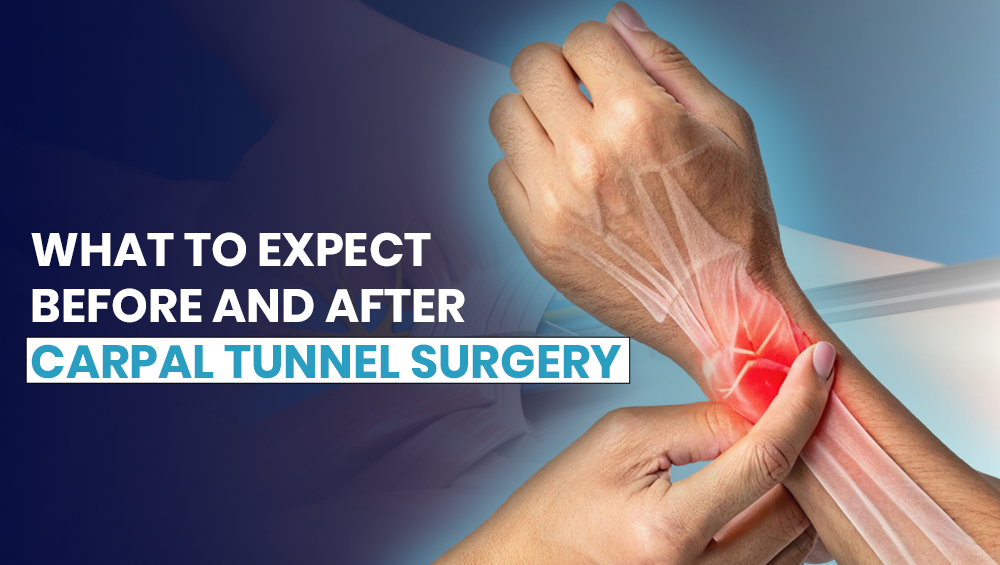Carpal Tunnel Syndrome (CTS) is one of the most common nerve disorders that affects the hands and wrist. It is caused by compression of the median nerve of the wrist leading to tingling, numbness and pain.
For most people treatment using splints, drugs and lifestyle changes gives relief for a while. In case symptoms persist carpal tunnel surgery could be the best treatment.
If you are preparing for surgery, here is the ultimate guide on what to anticipate before and after carpal tunnel syndrome surgery such as signs and treatment time and recovery time and when you should visit the most experienced orthopaedic doctor in Gurgaon.
What Is Carpal Tunnel Syndrome?
Carpal Tunnel Syndrome happens when the nerve that traverses your wrist, referred to by the name median nerve is compressed into a narrow passageway called the Carpal Tunnel. The tunnel is already small and as the tissues around it increase in size the area becomes tighter and the nerve starts feeling the pressure.
This pressure is what causes the familiar symptoms like:
- Numbness in the thumb, index, middle, and half of the ring finger
- Wrist pain that may feel worse at night
- Weakness when gripping or holding objects
- Fingers that often feel numb or “asleep”
If you don't address the issue it is likely to get worse and may even affect the strength of your hand in longer term. This is why timely treatment whether that is with lifestyle changes or surgery may significantly improve the condition.
Who Needs Carpal Tunnel Surgery?
Some patients do not require surgery. The mild cases can be treated by using splints or medication as well as hand therapy. However, surgery is recommended when:
- Symptoms last 6–12 months without relief
- The tingling and the numbness disrupt daily activities and sleeping
- Hand weakness affects grip strength
- Tests show severe median nerve compression
- There is visible muscle wasting near the base of the thumb
In these cases, carpal tunnel surgery provides long term relief and helps prevent permanent damage.
What to Expect Before Carpal Tunnel Surgery
Knowing what happens before surgery can ease anxiety and get you prepared for a smooth experience.
- Medical Check ups: Your doctor can conduct tests on nerves to determine the severity.
- Adjustments to Medication: blood thinners like warfarin and aspirin might need to be stopped at least a few days before.
- Fasting: If you suffer from local or general anesthesia you may need to stay away from food and drinks for a couple of hours before the scheduled time.
- Home Transportation: Hire someone else to bring you home, since you will not be capable of using your hand at the moment.
- Be calm: The procedure is quick, safe and is typically done as a day case procedure.
Symptoms Before Carpal Tunnel Syndrome Surgery
The following symptoms are likely to be experienced by those who undergo surgery:
- Tingling or numbness in the index, thumb and middle fingers
- A wrist pain that radiates upwards into the arm
- Trouble performing fine motor activities such as buttoning shirts or writing
- Waking at night from pain or "pins and needles" in fingers
- Weak grip and dropping of objects
What to Expect After Carpal Tunnel Surgery
Immediate Recovery
- Hand will be bandaged
- Mild pain, swelling or soreness is normal
- Gentle finger movement is encouraged to prevent stiffness
Short Term (1–2 Weeks)
- Stitches are removed within 10–14 days
- Many people return to desk jobs during this time
- Light daily activities can be resumed
Mid Term (4–6 Weeks)
- Grip strength improves
- Tingling and numbness reduce
- Manual workers may return to jobs involving physical effort
Long Term (3 Months and Beyond)
- Most patients regain full hand function
- Severe cases may take longer for complete nerve recovery
- Hand therapy may be suggested for strength and flexibility
Symptoms After Carpal Tunnel Syndrome Surgery
Positive changes:
- The tingling and pain at night typically go away
- Hand coordination and grip strength increase
- Every day activities become simpler
Temporary effect:
- Swelling or mild stiffness
- Tenderness around the site of the scar
- An ailment that improves with therapy
How Long Does Carpal Tunnel Surgery Take?
Carpal tunnel surgery is a quick and easy procedure:
1. Duration: Typically 15–30 minutes
2. Types:
- Open Surgery: One small incision in the palm to relieve pressure
- Endoscopic Surgery: Has a camera and smaller incisions and sometimes faster recovery
3. Anesthesia: Anesthesia is usually local the hand can be anesthetized but sometimes general or regional
4. Hospital Stay: The Hospital Stay is Outpatient. You might be able to go home the same day
Recovery Tips & Timeline
- Maintain your hand in a raised position during at least the initial few days to minimize swelling
- Don't lift anything heavy until your doctor says it's safe
- Do you need to do the recommended hand therapy exercises?
- Follow the wound care procedures attentively
- You can expect to fully recover in 6-12 weeks, based upon your personal lifestyle as well as commitments.
Why Choosing the Right Surgeon Matters
The outcome of surgery depends greatly on the surgeon’s experience. If you’re considering procedures such as Carpal Tunnel Surgery in Gurgaon, choosing the right specialist is essential. You can consult Dr. Yugal, who has over 14 years of experience and is regarded as a skilled orthopaedic surgeon in Gurgaon, skilled in hand and wrist surgeries. An expert surgeon ensures:
- Accurate diagnosis
- Safe surgical procedure
- Faster recovery
- Long-term relief from symptoms
Final Thoughts
Knowing what happens before and after carpal tunnel surgery sets you up for the process. The procedure is short, safe, and very effective in alleviating symptoms. Under the best orthopaedic surgeon in Gurgaon, you can anticipate regaining comfort and use of your hand.
FAQs For Carpal Tunnel Surgery
1. Is carpal tunnel surgery painful?
No. The operation is performed under anesthesia so that you won't feel anything. A little soreness afterwards is usual.
2. How long will I be off work?
- Desk jobs: typically 1–2 weeks
- Jobs that are physically demanding: 6–8 weeks
3. Will my symptoms go away completely?
Most people have a significant improvement. In really severe cases, some numbness can take longer to recover from.
4. How successful is the surgery?
About 90 to 95% of patients experience long term pain relief and tingling.


